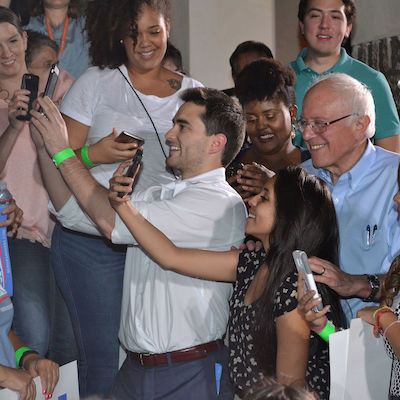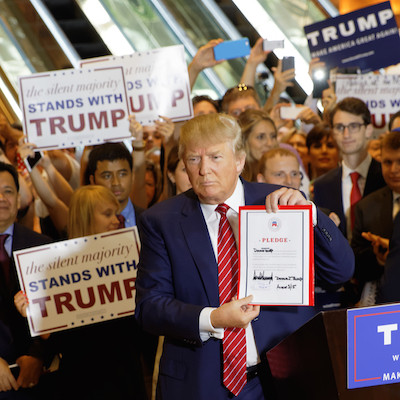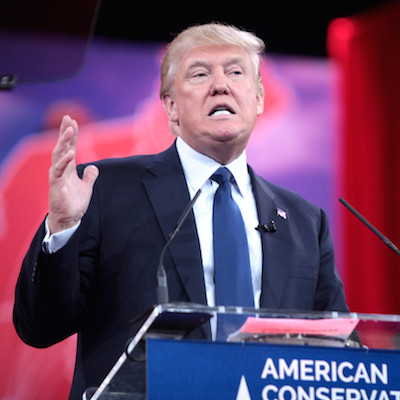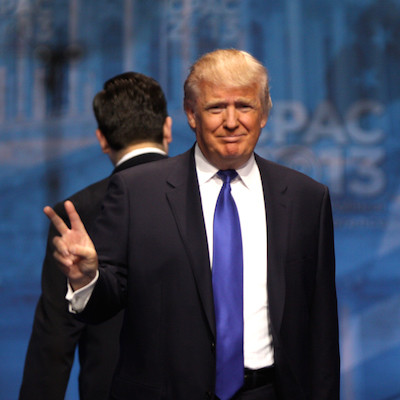Guest MINDSETTER™ Sheehan: Will We Meet on Common Ground?
Tuesday, March 29, 2016
The presidential candidacies of Donald Trump and U.S. Sen. Bernie Sanders attest to a widespread anger with our federal government. A similar sentiment pervades Rhode Island.
One way to begin changing this negative perception is to restore — after seven years’ absence — the Ethics Commission’s jurisdiction over the legislative duties of the General Assembly.
To do this, the state constitution must be amended.
GET THE LATEST BREAKING NEWS HERE -- SIGN UP FOR GOLOCAL FREE DAILY EBLASTI’ve worked on ethics reform for six years, and I believe the best way to achieve it is through compromise. Last year, I brought a group of stakeholders together to forge a solution. While no party was completely satisfied with the resulting compromise, I believe the “Common Ground” Ethics Amendment (2016-S 2427) represents the best resolution to restore ethical oversight of the General Assembly.
The two key issues in this compromise were: 1) To what degree should legislators be permitted to speak freely in shaping public policy/law? and 2) Should public officials found in violation of the state code of ethics receive an appeal (trial) on the merits of their conviction?
Two years ago, an initial compromise was introduced which won the support of good government groups. It addressed the first question by stating that legislators “shall be free, without question or penalty, to discuss and debate any matter within their core legislative duties.” Essentially this broad protection of free speech granted legislators a wide berth to conduct their business in the House or Senate, in committee or anywhere else at the State House without their freedom of speech being compromised.
However, the Ethics Commission would have been permitted to oversee a legislator’s drafting, sponsoring, and votes on any piece of legislation. The stakeholder group's compromise greatly narrowed the area of “free speech.” Under the Common Ground amendment, legislative speech would only be protected in the form of public discussion on the floor of the House or Senate or in committee during session. Any behind-the-scenes talk or discussion, written notes, drafting, sponsoring and voting on legislation would be subject to Ethics Commission oversight.
Further, under R.I. General Law (36-14-6), legislators who have a conflict of interest with a given bill must file a sworn statement of conflict with the Ethics Commission prior to voting. If not, a legislator with a conflict who did not file a sworn statement and/or voted with a conflict of interest could be charged with an ethics violation (a lack of filing and the vote themselves could be used as evidence against him or her).
This compromise protects essential legislative “speech” to discuss public policy/laws without restraint or regulation while permitting the Ethics Commission to vigorously and effectively police the public conduct of members of the General Assembly.
In response to the second question above, good government groups also objected to the creation of a new constitutional right to a trial de novo (new trial) appeal, which was added to the initial compromise bill two years ago. The de novo appeal would have permitted a new trial, on appeal, for any and all violators of the state code of ethics. It was this provision which caused good government groups to oppose the initial compromise ethics amendment two years ago.
In the interest of compromise, the Common Ground Amendment eliminated the “trial de novo” provision. In its place, a jury trial was limited to serious offenses, namely those which were considered a crime. Unlike the previous trial de novo provision, this jury trial right would only be recognized if the court agreed that public officials were already entitled to such a right under common law.
The Common Ground Ethics Amendment is a reasonable compromise. In spite of this, some legislators may prefer an amendment that would be opposed by the good government community. Conversely, some good government advocates cling to an ethics bill that would be opposed by legislators who wish to preserve free speech. It is unlikely that either of these versions would be approved by voters or the General Assembly.
The choice is clear: either both sides choose compromise and meet on common ground or the General Assembly likely will continue to operate in an ethics code vacuum for years to come. The former would begin to stem the tide of cynicism, while the latter would further fan the flames of anti-establishment anger in Rhode Island politics — and to what end?!
The author, James C. Sheehan, is a Democratic state senator representing District 36 in North Kingstown and Narragansett. He resides in North Kingstown.
Related Slideshow: 10 Ways Bernie Sanders and Donald Trump Are Actually Similar
Related Articles
- Guest MINDSETTER™ Rep. Morgan: GOP Fought to Make Terrible Toll Bill Better
- Guest MINDSETTER™ Robert Billington: Welcome Home Pawtucket Red Sox
- Guest MINDSETTER™ Rep. McKiernan: Car Tolls Benefiting General Fund Will Not Happen
- Guest MINDSETTER™ Sen. Sheehan: Ethics Reform - or a Festering Status Quo
- Guest MINDSETTER™ Rep. Ruggiero: RhodeWorks - The Right Route to a Stronger Economy
- Guest MINDSETTER™ Santos: RhodeWorks Amnesty for East Bay & Aquidneck Island
- Guest MINDSETTER™ Forleo: CCRI About to Undergo Political Takeover
- Guest MINDSETTER™ Santos: Governor Raimondo’s Toll Road to Washington
- Guest MINDSETTER™ Jared Moffat: Tax Marijuana in RI, Not Medicine
- Guest MINDSETTER™ Fitzpatrick: What Buddy Cianci Taught Me
- Guest MINDSETTER™ Tony Jones: Let’s Utilize Cannabis to Help Pay for RI’s Roads
- Guest MINDSETTER™ Zurier: The Best Way To Ensure Quality Public Education For All Rhode Islanders
- Guest MINDSETTER™ Tom Kenney: Destruction of The PFD
- Guest MINDSETTER™ Stu Mundy: Teamsters for Trump? I Don’t Think So!
- Guest MINDSETTER™ Fine: What Does Drug and Alcohol Use Cost Rhode Island?
- Guest MINDSETTER™ Tom Kenney: Fire Pare
- Guest MINDSETTER™ Berwick: Tax Reform in Rhode Island
- Guest MINDSETTER™ Archambault: Surprise Billing Can be Financially Disastrous to Patients
- Guest MINDSETTER™ Fine: How Many Drugs & How Much Alcohol Do Rhode Islanders Use?
- Guest MINDSETTER™ Ajello: Cell phone Location Data Merits Protection
- Guest MINDSETTER™ DeNuccio: RI Should Reject Marijuana Legalization
- Guest MINDSETTER™ Santos: RhodeWorks RI, a Constitutional Pandora’s Box
- Guest MINDSETTER™ Conley: Don’t Tamper With Our Treasure - History is Not for Hacks!
- Guest MINDSETTER™ Tom Kenney: Commissioner Pare Should be Fired
- Guest MINDSETTER™ Morse: 1 Great Thing to do This Weekend - Attend Easter Vigil Mass










_399_399_90.jpg)









_80_80_90_c1.jpg)



